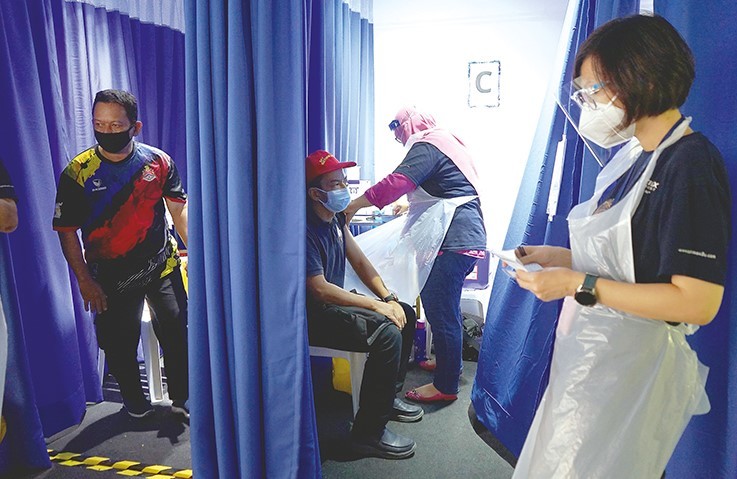
At least 50,000 more small and medium enterprises (SMEs) may be out of business should the Movement Control Order (MCO 3.0) extend another six weeks.
SME Association of Malaysia national VP Chin Chee Seong said about 100,000 companies have ceased operations since the first MCO.
“The affected SMEs, especially in retail and food and beverages (F&B), are just hanging on at the edge of a cliff. About 40% have indicated that they will shut down their businesses should the lockdown continue for the next four weeks.
“From our recent survey, only 8.6% of the SMEs said business is as usual, but the remaining 91.4% indicated that they will suffer losses from 25% to 100%,” he told The Malaysian Reserve (TMR).
The association has close to 10,000 direct and indirect members. Chin suggested for the government to introduce an auto moratorium for six months to all micro entrepreneurs and SMEs that are affected, not only those that cannot operate during MCO.
He said the Targeted Repayment Assistance (TRA) is not effective as the requirements are still stringent.
“This fund is currently still available from the last few stimulus packages and has yet to be fully utilised.
“Financing should be provided at a subsidised rate rather than the current rate at 3.5%,” he added.
On the Wage Subsidy Programme (WSP), he said there are a total of 1.1 million SMEs in the country, but the government only allocates subsidies to 200,000, which is not enough.
“What about the remaining 800,000 SMEs?
“The government should make use of the data from the International Trade and Industry Ministry’s Covid-19 Intelligent Management System to filter those allowed to operate during the MCO and ensure these companies do not enjoy the WSP. Only provide to those who really need the help.”
Small and Medium Enterprises Association (Samenta) central chairman Datuk William Ng urged the government to extend the WSP and the moratorium to the end of the year.
He said many SMEs survived 2020 because they were either in the right industry or they dipped into their own savings to pay salaries and suppliers.
“This time round, many are simply no longer able to do so. For many SMEs, the MCO 3.0 is going to be even tougher.
“This is because during MCO 1.0, many SMEs still had some reserves and were able to withstand the loss in business with some government assistance. This time, most SMEs have run out of funds,” he told TMR.
SMEs are now put in a position where they must choose whether to pay their loans first or their suppliers first.
“We understand that banks also need to turn a profit. In our survey in January, 68% of the SMEs said they were down to their last three months of reserves.
“Our dipstick study when MCO 3.0 was announced showed that almost a full one-third of SMEs are down to their last month of reserves.
“Without any meaningful intervention, we could lose them to the pandemic. This translates to hundreds of thousands of jobs.”
Malaysian Entrepreneurs Foundation (MEF) chairman Nitesh Malani said the impact on SMEs amid MCO 3.0 is one of low confidence, overstretched credit and looming bankruptcies.
He said as the most vulnerable group, SMEs are seeing drastic demand contraction for their products as a result of the economic disruptions.
“Firms engaged in services are the worst affected, with those engaged in accommodation and food services bearing the brunt, followed by non-food manufacturing, retail and wholesale, as well as travel and transport.
“65% reported that they are strongly affected as a result of partial and full lockdowns, while 95% experienced a reduction in sales,” he told TMR.
He believed a TRA extension is necessary for the survival of SMEs until the end of the year to provide a buffer of sustainability.
“Unfortunately, we have seen 12% of SMEs shut down during the 2020-2021 period. 35% are on temporary closure, while 9% of SMEs have reduced their workforce by 45% in the past 12 months.
“Our projection is 30%, given the pandemic is not going to end soon and that the government will continue to impose partial and/or full lockdown in the coming months.”
There are more than 5,000 SMEs registered under the MEF.
Nitesh said a comprehensive, all-inclusive Covid-19 care pack and recovery aids from the government are needed.
“The care pack should be tailored based on individual industry’s needs and to be executed on a most urgent basis.
“A Covid-19 Economic Fund must be established to enable more businesses to tap into, while loans and credit facilities must be softened for the next 12 months.
“We have submitted many targeted initiatives through Industries Unite and look forward to its incorporation in weeks to come.”
Source: https://themalaysianreserve.com/2021/06/08/50000-smes-face-closure-under-mco-3-0/

